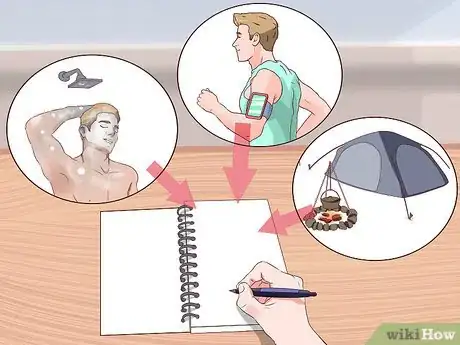This article was co-authored by Trudi Griffin, LPC, MS. Trudi Griffin is a Licensed Professional Counselor in Wisconsin specializing in Addictions and Mental Health. She provides therapy to people who struggle with addictions, mental health, and trauma in community health settings and private practice. She received her MS in Clinical Mental Health Counseling from Marquette University in 2011.
There are 9 references cited in this article, which can be found at the bottom of the page.
wikiHow marks an article as reader-approved once it receives enough positive feedback. In this case, 86% of readers who voted found the article helpful, earning it our reader-approved status.
This article has been viewed 154,975 times.
It can be difficult to ignore something or someone that’s bothering you or stressing you out. Ignoring isn't necessarily a long-term solution, but sometimes if you’re very stressed or bothered you’ll need to learn to let go in the moment to better take care of yourself. If you can distract yourself from what’s bothering you, then try to stay present and reframe your thinking, you’ll be better able to move on from what’s bothering you.
Steps
Distracting Yourself
-
1Take a break. Take a break from what’s bothering you by re-focusing your energy on positive, relaxing, and/or enjoyable activities. People who can refocus on positive activities instead of dwelling on unwanted thoughts or stress tend to be less depressed. Some relaxing ways you can take a break include:[1]
- Taking a bath.
- Reading a book.
- Playing a game.
- Going to see a movie with a friend.
-
2Exercise. Exercise is a healthy distraction for mind and body. It can be as simple as taking your dog for a walk, doing jumping jacks and stretching inside your home, or going for a run. Try taking an exercise class that will allow you to focus all of your attention on specific body movements. Some good classes for staying focused on your body are Zumba, spinning, and Tai Chi.[2]Advertisement
-
3Get some fresh air. Go outside to get out of your head. A change of scenery will leave you feeling more alert and energized. Getting outside, especially in a peaceful setting, will help to clear your mind from what’s bothering you.[3]
- If you can’t get outside, or if the outdoors aren’t very peaceful where you are, try imagining a safe, peaceful place you enjoy or would rather be.
-
4Do something creative. Engaging in something creative can be fun, calming, and distracting. Creating something will give you a confidence boost and a sense of accomplishment. Focus on trying to have fun with the process of whatever it is you choose, rather than the end result. You can try:
- Painting
- Drawing
- Gardening
- Journaling
- Taking photos
-
5Reach out for help. At a certain point or in certain situations, it may be too difficult or detrimental to your health to distract yourself from what’s bothering you. Reach out for help from friends, family, doctors, or mental health professionals when your stress about a person or situation becomes too much to handle on your own. Some examples of things you should not ignore include:[4]
- Experiencing or remembering trauma, such as family violence, an accident, or sexual assault.
- Experiencing thoughts to harm yourself or others.
- Experiencing physical and emotional symptoms of depression or anxiety.
Staying Present
-
1Meditate. Meditation is a great way to focus your mind on body and breath, rather than on whatever may be bothering you. Find a comfortable spot free from noise and distraction. Try meditating for a few minutes at a time and as you get more comfortable, you can practice this more frequently and longer.[5]
- Sit comfortably for a few minutes and take note of how you’re breathing. Deliberately take a few slow, deep breaths and focus on how and where the breath flows through your body. Notice any distractions that come up, but always return your attention back to your breath. Repeat 6 to 8 times.
-
2Try grounding techniques. Grounding techniques help to keep you present and focused on reality, rather than on what may be bothering you or causing you anxiety.[6] You can practice grounding anywhere by simply focusing in on one of your five senses.
- For example, concentrate your mind on hearing everything in your space, focusing on a certain color in your surroundings, or feeling everything your body is in contact with. Notice the details and say out loud the sensations you're experiencing.
-
3Do a balance pose. Yoga is a great way to stay present and focused on your body and breath. Try staying in a yoga balance pose, such as tree pose. Focus your attention on your muscles and keeping your foot firmly planted on the ground. Every time you sway represents your mind wandering.
-
4Make a list of what you can do. When something’s bothering you that you cannot control at the moment, make a list of what you can do, then attempt to cross something off the to-do list. This will help you to re-focus on something different and will give you back a sense of control. Write down a list of everything you want to do and are capable of doing, then separate everything into three categories:[7]
- What you can do today.
- What you need to get done soon, but not immediately.
- What can wait a few days or longer.
-
5Stick to a routine. To help keep you energized and focused on important things, try to stick to a routine. Set regular times for meals, sleeping, working, exercising, and socializing with others. This will train your brain to stay on track and will help preserve energy for any difficult decisions or tasks you face.
Reframing Your Thinking
-
1Acknowledge what’s bothering you. Take time to acknowledge what’s bothering you. Is it an unwanted thought, memory, or image? Is it someone else’s annoying habit? Whatever it is, before you ignore it and move on you first have to know what it is that’s bothering you and why.
- Keep in mind that some things can be detrimental to ignore, such as medical symptoms or a coworker stealing your project ideas.
-
2Accept what you cannot control. Accept that you cannot control other people, events, or situations. Rather, you can only control your reactions to them. Remember that you getting annoyed about something will not change the fact that it’s happening, so why bother wasting the energy?[8]
- Some people find the Serenity Prayer useful for this. You can say, "Grant me the serenity to accept the things I cannot change, the courage to change the things I can, and the wisdom to know the difference."
-
3Practice positive self-talk. When you’re trying to ignore something and it pops into your head, try to develop a phrase to say to yourself that will replace your unwanted negative thought. It's helpful to replace unwanted thoughts with something more positive and affirming. Some things you might say include:[9]
- “I'll give it another try, I can do this."
- “You've got this."
- "Keep going."
-
4Focus on the positives around you. Instead of paying attention to anything negative or annoying in your environment, try to stop and smell the roses. You might not be able to completely ignore the bad things, but you can retrain your brain to focus more on the good things. Try to do this a few times each day and you’ll notice a difference in your mood.[10]
- For example, take time to notice how nice the weather is outside. Enjoy the feeling and savor the moment for at least 10 seconds. Just relax into the feeling.
Warnings
- Know what to ignore and what not to ignore. Small annoyances, like someone leaving the toilet seat up, are easy to ignore. More serious things, like medical problems or suicidal thoughts, should not be ignored.⧼thumbs_response⧽
References
- ↑ https://youngwomenshealth.org/guides/stress/
- ↑ https://www.health.harvard.edu/staying-healthy/exercising-to-relax
- ↑ https://www.heart.org/en/healthy-living/healthy-lifestyle/stress-management/spend-time-in-nature-to-reduce-stress-and-anxiety
- ↑ https://www.mentalhealthfirstaid.org/2020/08/the-importance-of-having-a-support-system/
- ↑ https://www.health.harvard.edu/blog/mindfulness-meditation-may-ease-anxiety-mental-stress-201401086967
- ↑ https://www.helpguide.org/articles/stress/quick-stress-relief.htm
- ↑ https://my.clevelandclinic.org/health/articles/8133-stress-10-ways-to-ease-stress
- ↑ https://my.clevelandclinic.org/health/articles/8133-stress-10-ways-to-ease-stress
- ↑ https://www.heart.org/en/healthy-living/healthy-lifestyle/stress-management/3-tips-to-manage-stress
About This Article
It can be difficult to ignore something that’s bothering you, but by distracting yourself and reframing the situation, you can start to move past it. Try doing something fun, like reading a book, playing a game, or watching a movie. If you feel creative, draw a picture, write a short story, or do some arts and crafts. Alternatively, get out of the house and do some exercise, such as lifting weights, riding your bike, or playing a sport. If you still keep thinking about the thing that’s bothering you, try to accept that you can’t control other people or situations. Instead, focus on the positive things in your life, like healthy relationships and fun hobbies. If you're feeling really depressed or angry about whatever's bothering you, consider talking to a close friend, doctor, or mental health professional to help you process your emotions. For more tips from our co-author, including how to be more present in the moment, read on!













































































Medical Disclaimer
The content of this article is not intended to be a substitute for professional medical advice, examination, diagnosis, or treatment. You should always contact your doctor or other qualified healthcare professional before starting, changing, or stopping any kind of health treatment.
Read More...